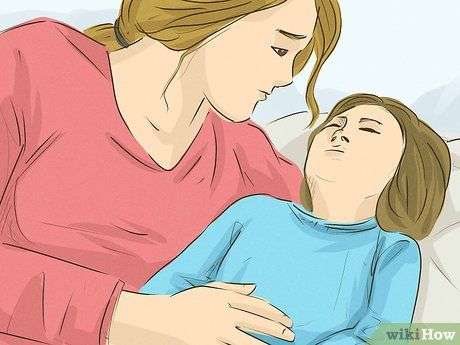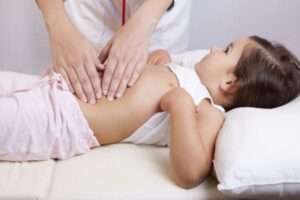Tummy Pain in Kids: Causes and Solutions
- Dr Owais Rafiq
- August 11, 2024
- 2:54 pm

Children of all ages complain of abdominal pain, sometimes known as tummy pain. “I have tummy pains.” That shows a common complaint from children who seek care in urgent care or emergency department. Acute abdominal pain is commonly caused by self-limiting conditions but also may herald serious medical or surgical emergencies, such as appendicitis.

What can cause tummy pain in children:
causes |
mechanism |
Time duration |
| Constipation | Hard stools or infrequent bowel motions that are uncomfortable
|
Chronic (persistent for more than three months) |
| Indigestion of the stomach | Inadequate digestion of food might cause discomfort.
|
Acute or persistent |
| Urinary Tract Infections (UTIs), Gastrointestinal
|
invasion of the urinary or digestive systems by bacteria or viruses
|
Acute (pain last few hours or days) |
| Sadness or anxiety
|
Physical discomfort brought on by emotional distress persistent
|
Chronic (persistent for more than three months) |
| Inflammatory Bowel Disease (IBD) | intestinal dysfunction persistent
|
Chronic (persistent for more than three months) |
| Appendicitis | Appendix inflammation
|
Acute (pain last few hours or days) |
| abdomen, muscle strain, or migraine | severe episodes of paroxysmal per umbilical pain accompanied by symptoms such as headache, nausea, vomiting, anorexia, photophobia, or pallor
|
Acute (pain last few hours or days) |
| Lead poisoning | Toxic effects of lead on the body, contained in batteries of toys | Chronic (persistent for more than three months) |
| Misuse or overtake of medicine for tummy in children | Antibiotic overdose can cause stomach upset and diarrhea but is rarely dangerous | Acute (pain last few hours or days) |

Identifying symptoms of tummy pain in children:
A parent or caregiver usually can notice pain in a child’s abdomen. Infants and very young toddlers may cry, express pain facially, and curl up. Young children are usually quick to tell you what is wrong. Some teenagers may be reluctant to report pain, and you must try to get a clear explanation of what they are feeling. Ask about these conditions:
- The appearance of the child: Often, the caregiver “just knows” the child is very sick. When abdominal pain occurs, key things to look for include pale appearance, sweating, sleepiness, or listlessness. It is most concerning when a child cannot be distracted from the pain with play or refuses to drink or eat for several hours.
- Vomiting: Children vomit quite frequently with abdominal pain, but vomiting does not always indicate a serious problem. However, as with the duration of the pain, most simple causes of vomiting go away very quickly.
- Nature of the vomiting: In infants and very young children, vomiting that is green or yellow is a reason to call the doctor.
- Diarrhea: Diarrhea is also common with abdominal pain and usually indicates that the cause is a virus. This can continue for several days but usually only lasts less than 72 hours (three days).
- Fever: The presence of a fever does not always indicate a serious problem. Indeed, a normal temperature can be seen with the more serious causes of abdominal pain.
- Urinary problems: If you experience severe or frequent urination together with abdominal pain, it may indicate an infection that needs to be treated by a physician.
- Rash: Several important reasons for stomach pain are also linked to a recent rash. When you have both an abdominal ache and a skin rash, you should call your doctor.

When to seek immediate medical care:
Children’s abdominal pain is frequently managed at home with home care. Ensure the child is receiving enough sleep, give them drinks to avoid dehydration, and avoid solid foods, antibiotics (unless prescribed by a physician), and herbal supplements.
When to Get Medical Help:
- Vomiting
- Diarrhea
- blood in the urine or stools
- appetite loss
- weight loss
- stomach discomfort that never goes away
- breathing difficulties
- Lack of water
- extreme discomfort or suffering
- Slight jaundice (yellowish discoloration of skin)
Misusing or overtaking the medicine for tummy pain in children can exacerbate the tummy pain in children.
Managing tummy pain in children at home remedies:
A parent or caregiver must be observant and should contact appropriate help at the appropriate time. Monitor a child especially closely during recovery until the child is better. A teenager may not want to be bothered but still should be monitored.
- Rest: A child with active abdominal pain often will benefit from resting. Lying face down may help relieve gas pain, but the optimal position is that which feels best to the child.
- Diet: People can survive a long time without solid food but need to keep up with liquids
- Dehydration takes time to develop, so forcing fluids is not always necessary.
- A child who is actively vomiting will not be able to hold down a large amount of liquid.
- Doctors recommend giving small amounts (1-2 ounces) at a time (every 15-20 minutes typically)
Fluids: Do not give water or boiled milk to infants, because it can cause serious problems with the salt content of their bodies. Also, milk is harder for a sick stomach to digest. Doctors recommend various dehydration liquids. Try to get the infant back on the usual feedings as soon as possible. Avoid tinted, carbonated, caffeinated, fatty, or excessively salty or sugary liquids (such as dark colas, tea, coffee, milk, sports drinks, and fruit juices). Don’t give your kids acid-reflux-producing foods or beverages.
Solid foods: The child will let you know when it is time to get back on solid food. Start them slowly, first try toast Bananas, apple sauce, plain toast, or cooked rice are also suitable foods for introduction after a full liquid diet.
Medications. Most doctors still avoid aspirin in children. Avoid antibiotics unless prescribed by a doctor. Physicians do not recommend herbal medicines or other home remedies. If you use them and later see a physician, be sure to tell the physician exactly what you gave the child because such information could affect the treatment recommendations.
Additional Remedies: To help calm and relax the child, rub their foot or back.
Encourage outdoor recreation as a means of reducing stress and improving overall health.
Prevention:
Steer clear of greasy or fatty foods as they can upset your stomach.
Reduce your intake of processed foods because they frequently have harmful fats, excessive sugar content, and artificial additives that might aggravate your digestive system.
Hand washing is important because it helps stop the transmission of bacteria that can lead to the stomach flu and other illnesses that cause pain in the stomach.
Promote physical activity: Frequent exercise improves gut health and digestion.
All cleaning products and potentially dangerous items should be kept in their original containers. This lessens the chance of toxicity and inadvertent intake.
Dr Owais Rafiq
Subscribe to Dr Owais YouTube channel
For parenting advice, child health, symptoms, causes and treatment of illness in children.






